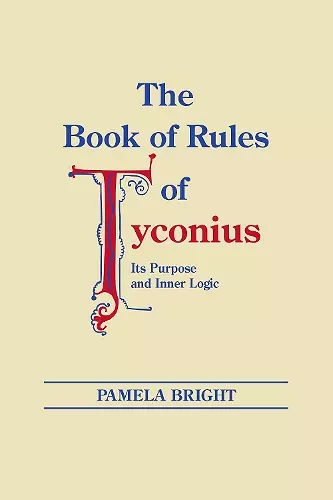Book of Rules of Tyconius, The
Its Purpose and Inner Logic
Format:Paperback
Publisher:University of Notre Dame Press
Published:15th Aug '09
Currently unavailable, and unfortunately no date known when it will be back

The Liber Regularum, written by Tyconius in the Fourth Century A.D., was the first system of biblical interpretation proposed by a Latin theologian. Augustine was very interested in this work and included an extraordinary summation of it in his De doctrina christiana. Although this treatment insured the preservation of the work and its lasting fame, Augustine's summary became better known than the original. Pamela Bright's The Book of Rules of Tyconius: Its Purpose and Inner Logic reintroduces this neglected classic of early church literature. Bright asserts that although Augustine was greatly influenced by the Liber Regularum, his philosophical differences caused him to misunderstand its meaning. Bright reexamines the meaning of “prophecy” and “rule” from Tyconius's perspective and reveals that the purpose of the book was not to provide a general guide to scriptural interpretation, but rather a way to interpret apocalyptic texts. She cites Tyconius's intense concern with evil in the church as the genesis of his interest in the apocalypse and subsequently the meaning of the scripture concerning it. Tyconius speaks of the “seven mystical rules” of scripture that with the grace of the Holy Spirit reveal the true meaning of prophecy. If an interpreter follows the “logic” of these rules, the nature of the church as composed by both good and evil membership is revealed. Bright argues that Tyconius was not illogical or incompetent in the work's composition as many critics have claimed but rather that he organized his material in a concentric pattern so that Rule Four, the center of the seven rules, is also the central development of his theory. Of interest to theologians, students of biblical interpretation and of Augustine, The Book of Rules of Tyconius focuses attention upon a work that had great influence on the understanding of the nature of the church, on interpreting scripture, and its meaning for the Church of its day.
“While lamenting the fact that the world knows the Liber regularum Tyconii primarily through Augustine's biased comments in De doctrina christiana and other interpreters, Bright attempts to set the record straight by allowing Tyconius to stand on his own. Even though generations of scholars have considered the Book of Rules confusing and disordered, Bright advances and successfully defends the novel hypothesis that Tyconius's Book of Rules does have an organization and plan, which manifests an inherent logic and order.” —The Catholic Historical Review
“Bright displays the chiastic structure of the Rules as the clue to deciphering [Tyconius's] interpretative theory. Here she is most convincing. She interprets the Rules as an extended typological interpretation of the Bible revealing the 'mystery of inquiry' at work in the church and calling sinners to repentence. . . . Bright's work is most valuable. . . . [It] is an enticing invitation to the reading of Tyconius for his own sake.” —Journal of Religion
“[Bright] . . . puts Tyconius in the context of his own time and carefully describes his seven rules of scriptural interpretation, clearly analyzing and affirming their unity. . . . Though at times painstaking to read . . . the effort is rewarding as it discloses Tyconius's intention to give the sincere reader an understanding of the obscurities in what he calls the 'immense forest of prophecy.' Bright lets Tyconius be Tyconius, a man clearly intent on orienting his biblical hermeneutics to his pastoral situation. His exegetical method is not the method of our times, which is the result of nineteen hundred years of exploring and explaining the scriptures. But his overall conviction that the scriptures derive from the Holy Spirit has a relevance for all seasons, maybe particularly today when biblical criticism has been coming under attack for its seeming lack of spiritual nourishment.” —Patristics
ISBN: 9780268022198
Dimensions: 229mm x 152mm x 12mm
Weight: 315g
208 pages